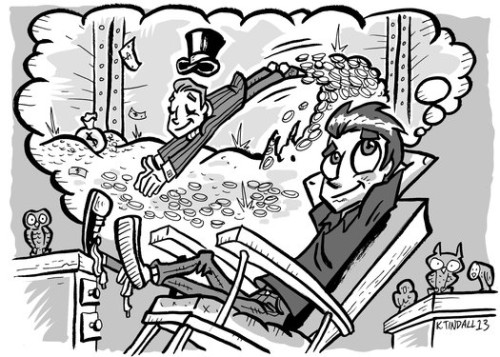Originally published in New Escapologist Issue Eight.
Fresh air is overrated. If it’s not carbon monoxide, my city-slicker lungs refuse to breathe it. A born urbanite, I prefer the human-made and the artificial to the natural. I’m perfectly happy for the natural world to continue unspoiled: I’d just prefer not to be in it.
People say that our built environment will be the death of us–the asbestos, the chemicals, the GM food and all that–but do you think nature wouldn’t kill us unthinkingly as soon as we give it chance? There are mountains that would collapse upon us without a moment’s consideration; oceans that would engulf us; tiny insects that would crawl up our piss pipes and lay their thousands of tiny eggs in the unnamed cavity within. All for no reason whatsoever!
There’s a book of mawkish animal photography called With Nature and a Camera. You know what I call it? With Nietzsche and a Camera. The natural world–the sublime, as artists call it–is as bleakly nihilistic as it gets. Nietzsche said “when you look into the abyss, the abyss looks into you.” Not in my experience. Looking out at the the sea, to me, is like looking into the unseeing glass eye of a taxidermied stoat.
Give me the indoors. Give me the city. Give me a bong and a box set of The Wire and fuck off with your natural world.
My experience of it is minimal. The last time I slept in a tent was at a music festival festival (as far from civilisation as I’m ever willing to stray) at which a fourteen-year-old twatofaboob started a barbecue mere inches from my head and almost kebabbed me in my sleep.
I once went “munro bagging” with some ignoramus colleagues. Far from being an attempt to seduce a waitress from a 1950s theme diner like I thought, it was actually a testosterone-fuelled clamber up a Scottish mountain high enough to have snow on the bastarding top. Needless to say, none of the things I brought with me were of any help whatsoever. It’s the last place on Earth you’d need to be wearing a New York Yankees costume. The headlines the morning after twelve librarians were airlifted from a mountain are not worth looking up.
And yet, Harmony With Nature is all too often cited as a key to the good life, a way to reconnect with our primal selves or something. Personally, I tend to reconnect with my primal self whenever I take a day off from work: I let my beard grow and roam around bellowing in my pants. But Tom Hodgkinson and his friends would have us “till the soil” and he seems happy. Journalist Richard Touv points out that a lack of nature in one’s life can lead to attention deficit disorder, depression, and obesity; and I’m living proof of that. So here’s a number of ways in which urbanite slackers such as myself might be able to merge safely with nature without it unthinkingly killing you in the process.
1. A fish tank
Short of a pet rock, an aquarium fish must be the least inspiring house animal of all time. They’re less of a domesticated friend than an aquatic prisoner. They don’t know who you are, don’t know how to relate to you, and I’ not even sure they’re aware of being in a tank. Fuck. They’re the Big Brother contestants of the natural world, forgetfully re-exploring the eight literal corners of their world, occasionally interacting with each other in the most perfunctory of ways, and living for the moment that the lid opens and they can suck up their tetra flakes, pinched onto the meniscus as if by the hand of God.
The great thing about a fish tank though, is that a whole ecosystem can be represented there: as well as fish, you can have plant life, algae, filth-gobbling snails. It’s a perfectly safe cuboid of nature in your own home. I like their long stringy turds too. Beats watching golf.
2. Cabinet of curiosities
If you’re a seasoned traveller or have friends who are seasoned travellers or have access to eBay, a cabinet of curiosities is a great way of allowing a sample of the outside in. River-polished stones; prehistoric fossils; paper-light small animal skulls; dried leaves and flowers; snake skins; anthropological pilferings: all objects you could add to your Victorian case of scavenged talking points. Not much of a joke is it, this one? I rather like the idea.
3. Pet Man
I used to have a pet man. He didn’t know he was my pet man, but the fish didn’t know they were my pet fish either. A glance out of my living room window afforded me a view through the curtainless bay window of one of nature’s most wretched specimens: a bachelor. He would sit, watching television, in his pants all day long. Around midnight, he’d fold his couch out into a bed, upon which he would sleep from midnight to noon. The effect from my perspective was of having a pet man, his one-room home a kind of human-being-itarium. “How’s your pet man?” people would ask me on the phone. A quick look out the window would qualify me to say, “He’s watching the television.” “Great!” they’d say.
4. Snow globe
The snow globe is nature safely contained in a glass blister. Terry Pratchett, in one of his books, calls them City Eggs, the idea being that a snow globe is the ovoid state of a living city: the landmarks of Paris or London or Cairo surrounded by glittery albumen. I love this idea. In the event that you ever have to go out into real nature, away from civilised society, take one of these City Eggs along with you as an emergency measure. Gawp into it and pine for home, remember the romantic smells of kebab shops and the sound of teenagers puking in the streets. When at home, as everyone in their right mind will be, give the snow globe a shake and imagine what it might be like to be in some weather.
5. One of those framed pictures of a woodland grove complete with trickling waterfall that you sometimes get in Indian restaurants
To complete the illusion of being in a woodland grove, why not buy one of those magic tree air fresheners from a car accessories store and waft it under your nose? Ah, fresh pine.
8. Christmas Tree
If you want to be able to smell real fresh pine, why not get yourself a Christmas tree? The best time to get one is when everyone else has thrown theirs unceremoniously out of the window on New Year’s Day. If your house is big enough, you could bring an entire discarded post-yuletide pine forest indoors and pretend you’re Tom Bombadil from Lord of the Rings. When somebody rings your doorbell, peek at them through the letterbox and, crouching in your indoor forest, quote from Tolkien’s best ever writing: “Hey dol! merry dol! ring a dong dillo! Ring a dong! hop along! fal lal the willow! Tom Bom, jolly Tom, Tom Bombadillo!”
7. A vivarium
Entombing living creatures in a glass menagerie? Why stop at fish? Spiders, stick insects, small amphibians, chipmunks, gerbils, mice, rats, earwigs, the unwittingly cloned homunculi of your human enemies. A whole world of small animals are eagerly waiting to be incarcerated in one of your artificially-regulated dioramas.
8. Bonsai
Even safer than a brick of fish is a miniature forest on your own desktop. To the Western agoraphobe, the Japanese art of bonsai might be the most interesting natural microcosm of them all. A stunted tree is a great way to observe nature in miniature. You won’t be expected to climb the tree–wheezing fatly and scuffing up your converse–nor will it burst a root through your living room floor in a hundred years time. Best of all, there’s probably a Japanese Hikikomori type out there somewhere, admiring a miniature English oak from the comfort of their closet. In a way, the two of you are married.
9. Yoghurt
The oldest empire on the Earth. Bacteria! Open a Yakult and look at it for a while. Ask it a question. You are at one with microscopic nature.
10. A David Attenborough DVD
Ah, safety. Watching a David Attenborough DVD is like a return the womb. Except that you’re probably not surrounded by amniotic fluid. If you find that you’re surrounded by amniotic fluid, you should probably see someone about that, as you may unknowingly be some kind of really awful serial killer. Aside from that fact, watching a David Attenborough DVD is like a return to the womb. If the womb was anything like a living room with a DVD player in it. Which it’s not. Womb.
11. Your own self-confirming prejudices
Unless you really want to go outside, why not take a stroll through the primitive Holodeck of your own imagination? Slap on an eye mask, and take a walk in the exotic wilderness of your brain. Try and imagine what nature might look like, feel like, smell like. Don’t worry if it’s too smelly: you can imagine up a thermostat-like dial and turn the pong down. If you find yourself involuntarily fantasising yourself crushed by an avalanche or impregnated by a parasitoid wasp whose larvae devour you from the inside out, you should probably either see a psychiatrist or simply not use your imagination again. Board up the windows and place an advert in the Exchange & Mart and be done with it.
Nature. It’s what’s for dinner.
🌲
If you enjoyed this story, (a) shame on you, and (b) please consider buying my books A Loose Egg and Stern Plastic Owl for countless other flights of fancy.

